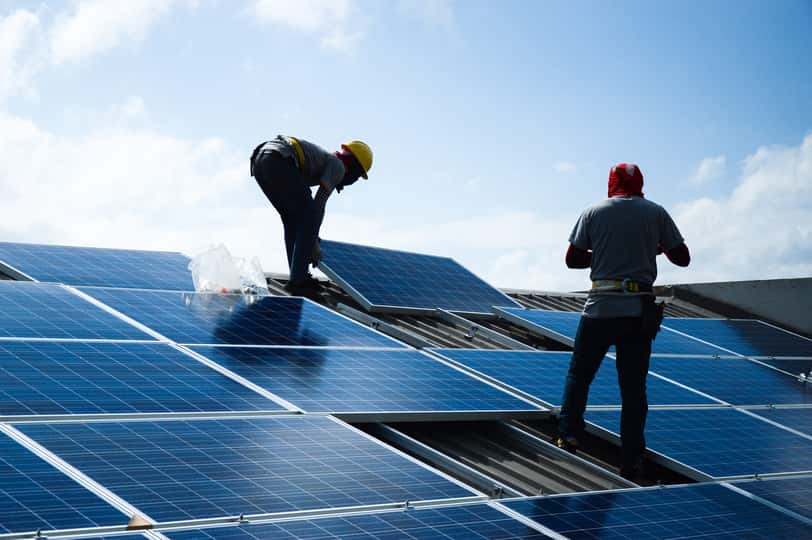The solar industry is growing rapidly thanks to global climate change concerns and favorable government policies. The ongoing transition to cleaner energy sources like solar is boosting the industry’s long-term prospects.
Amid this backdrop, it could be wise for investors to add solar stocks iSun, Inc. (ISUN - Get Rating), SPI Energy Co., Ltd. (SPI - Get Rating), and JinkoSolar Holding Co., Ltd. (JKS - Get Rating) to their watchlist.
Before diving deeper into the fundamentals of these stocks, let’s discuss why the solar industry is well-positioned for growth.
Solar stocks have had a challenging run this year, as is evident from the Invesco Solar ETF’s (TAN) negative 39.8% returns year-to-date. In comparison, the S&P 500 has risen 14% year-to-date. Despite the underperformance, the long-term prospects of solar as an energy source cannot be discounted.
Solar power will be crucial in cutting greenhouse gas emissions and combating climate change. Solar power will power electric cars, heat homes, generate electricity, power factories, etc. The global solar energy market is expected to grow at a CAGR of 12.3% to reach $300.30 billion by 2032.
The U.S. solar industry installed 5.6 gigawatts-direct-current (GWdc) capacity during the second quarter of 2023, rising 20% year-over-year but declining 8% sequentially. Through the first half of 2023, 153 gigawatts of direct current (GWdc) of solar capacity was installed, and the figure is expected to grow to 375 GWdc by the end of 2028.
According to the Solar Energy Industries Association (SEIA), the U.S. solar industry expects to add a record 32 gigawatts (GW) of new capacity in 2023, a rise of 52% year-over-year. According to Bloomberg NEF, global new investment during the first six months of 2023 rose 22% year-over-year to $358 billion.
Investments in large, small-scale solar systems were $239 billion during the first half of the year, rising 43% year-over-year. Moreover, the Inflation Reduction Act (IRA) pledged $369 billion to expand renewable energy production over the next ten years. This is further expected to boost the industry’s prospects.
Considering these conducive trends, let’s analyze the fundamental aspects of the three Solar industry picks, beginning with the third choice.
Stock #3: iSun, Inc. (ISUN - Get Rating)
ISUN is a solar energy company that provides design, development, engineering, procurement, installation, storage, and electric vehicle infrastructure services for residential, commercial, industrial, and utility customers in the United States. It also provides electrical contracting services; and data and communication services.
In terms of the trailing-12-month asset turnover ratio, ISUN’s 1.05x is 33% higher than the 0.79x industry average. However, its 21.24% trailing-12-month gross profit margin is 29.9% lower than the 30.31% industry average. Its 4.58% trailing-12-month levered FCF margin is 26.4% lower than the 6.22% industry average.
ISUN’s earned revenue for the second quarter ended June 30, 2023, increased 51.8% year-over-year to $25 million. On the other hand, its operating loss narrowed 68.8% year-over-year to $1.75 million. In addition, its net loss and adjusted EPS narrowed 55.8% and 95.7% over the prior year quarter to $2.51 million and $0.01, respectively.
Street expects ISUN’s revenue for the quarter ended September 30, 2023, to increase 40.1% year-over-year to $26.67 million, while its EPS for the same quarter is expected to remain negative. Over the past year, the stock has declined 92.6% to close the last trading session at $0.17.
ISUN’s uncertain outlook justifies its overall rating of C, which translates to Neutral in our proprietary POWR Ratings system. The POWR Ratings assess stocks by 118 different factors, each with its own weighting.
It is ranked #5 out of 16 stocks in the Solar industry. It has a C grade for Value, Sentiment, and Quality. Click here to see ISUN’s ratings for Growth, Momentum, and Stability.
Stock #2: SPI Energy Co., Ltd. (SPI - Get Rating)
SPI provides photovoltaic and electric vehicle (EV) solutions for business, residential, government, and utility customers and investors in Australia, Japan, Italy, the United States, the United Kingdom, and Greece. The company offers engineering, procurement, and construction services to independent power developers and producers, and commercial and industrial companies.
In terms of the trailing-12-month Capex/Sales, SPI’s 4.18% is 72.7% higher than the 2.42% industry average. Likewise, its 0.86x trailing-12-month asset turnover ratio is 38.9% higher than the 0.62x industry average. However, the stock’s 8.95% trailing-12-month gross profit margin is 81.9% lower than the 49.41% industry average.
SPI’s net sales for the fiscal second quarter ended June 30, 2023, increased 21.1% year-over-year to $58.90 million. Its gross profit increased 35.3% over the prior-year quarter to $5.20 million.
On the other hand, its net loss attributable to shareholders of SPI widened 8.7% year-over-year to $2.50 million, while its loss per share remained flat year-over-year to $0.08.
For the quarter ended September 30, 2023, SPI’s revenue is expected to increase 51.6% year-over-year to $65.50 million. However, its EPS for the fiscal 2024 is expected to decrease 20.2% year-over-year to $0.67. It failed the consensus EPS estimates in each of the trailing four quarters. Over the past month, the stock has declined 2.2% to close the last trading session at $0.72.
SPI’s bleak prospects are reflected in its POWR Ratings. It has an overall rating of C, which translates to a Neutral in our proprietary rating system.
It has a C grade for Value and Stability. Within the same industry, it is ranked #2. To see SPI’s ratings for Growth, Momentum, Sentiment, and Quality, click here.
Stock #1: JinkoSolar Holding Co., Ltd. (JKS - Get Rating)
Headquartered in Shangrao, the People’s Republic of China, JKS engages in the design, development, production, and marketing of photovoltaic products. The company offers solar modules, silicon wafers, solar cells, recovered silicon materials, and silicon ingots. It also provides solar system integration services and develops commercial solar power projects.
On October 25, 2023, JKS’ affiliate signed a supply agreement to provide 3.8 GW of N-type Tiger Neo modules for ACWA Power’s projects in Saudi Arabia, the 1,581MWp Al KAHFAH, and the 2,257MWp AR RASS 2. These modules offer enhanced efficiency and reliability compared to conventional panels.
Robin Li, General Manager at JKS, Middle East and North Africa (MENA), said, “ACWA Power continues to be the world’s largest private water desalination company and also a pioneer in green energy transition. We are excited to be expanding our MENA footprint and engaging in a more diversified and innovative cooperation with ACWA Power.”
In terms of the trailing-12-month EBIT margin, JKS’ 6.17% is 26.5% higher than the 4.88% industry average. Likewise, its 0.97x asset turnover ratio is 57.1% higher than the 0.62x industry average. However, the stock’s 16.54% trailing-12-month gross profit margin is 66.5% lower than the 49.41% industry average.
JKS’ total revenues for the third quarter ended September 30, 2023, rose 63.1% year-over-year to RMB31.83 billion ($4.37 billion). Its gross profit increased 99.7% year-over-year to RMB6.13 billion ($841.86 million). Also, its net income attributable to JKS and net income attributable to JKS per ADS came in at RMB1.32 billion ($181.28 million) and RMB18.46, up 140.7% and 188.9% year-over-year.
On the other hand, its total operating expenses increased 4.5% year-over-year to RMB3.14 billion ($431.23 million).
Analysts expect JKS’ EPS for the quarter ending December 31, 2023, to increase 203.8% year-over-year to $2.51, while its revenue for the same quarter is expected to decrease 5.1% year-over-year to $4.18 billion. Over the past month, the stock has gained 19.5% to close the last trading session at $34.03.
JKS’ POWR Ratings are consistent with this uncertain outlook. It has an overall rating of C, which translates to Neutral in our proprietary rating system.
It has a C grade for Growth and Quality. Within the Solar industry, it is ranked first. To see JKS’ ratings for Value, Momentum, Stability, and Sentiment, click here.
What To Do Next?
Discover 10 widely held stocks that our proprietary model shows have tremendous downside potential. Please make sure none of these “death trap” stocks are lurking in your portfolio:
Want More Great Investing Ideas?
JKS shares were trading at $33.74 per share on Wednesday morning, down $0.29 (-0.85%). Year-to-date, JKS has declined -17.47%, versus a 15.46% rise in the benchmark S&P 500 index during the same period.
About the Author: Abhishek Bhuyan

Abhishek embarked on his professional journey as a financial journalist due to his keen interest in discerning the fundamental factors that influence the future performance of financial instruments. More...
More Resources for the Stocks in this Article
| Ticker | POWR Rating | Industry Rank | Rank in Industry |
| JKS | Get Rating | Get Rating | Get Rating |
| SPI | Get Rating | Get Rating | Get Rating |
| ISUN | Get Rating | Get Rating | Get Rating |






